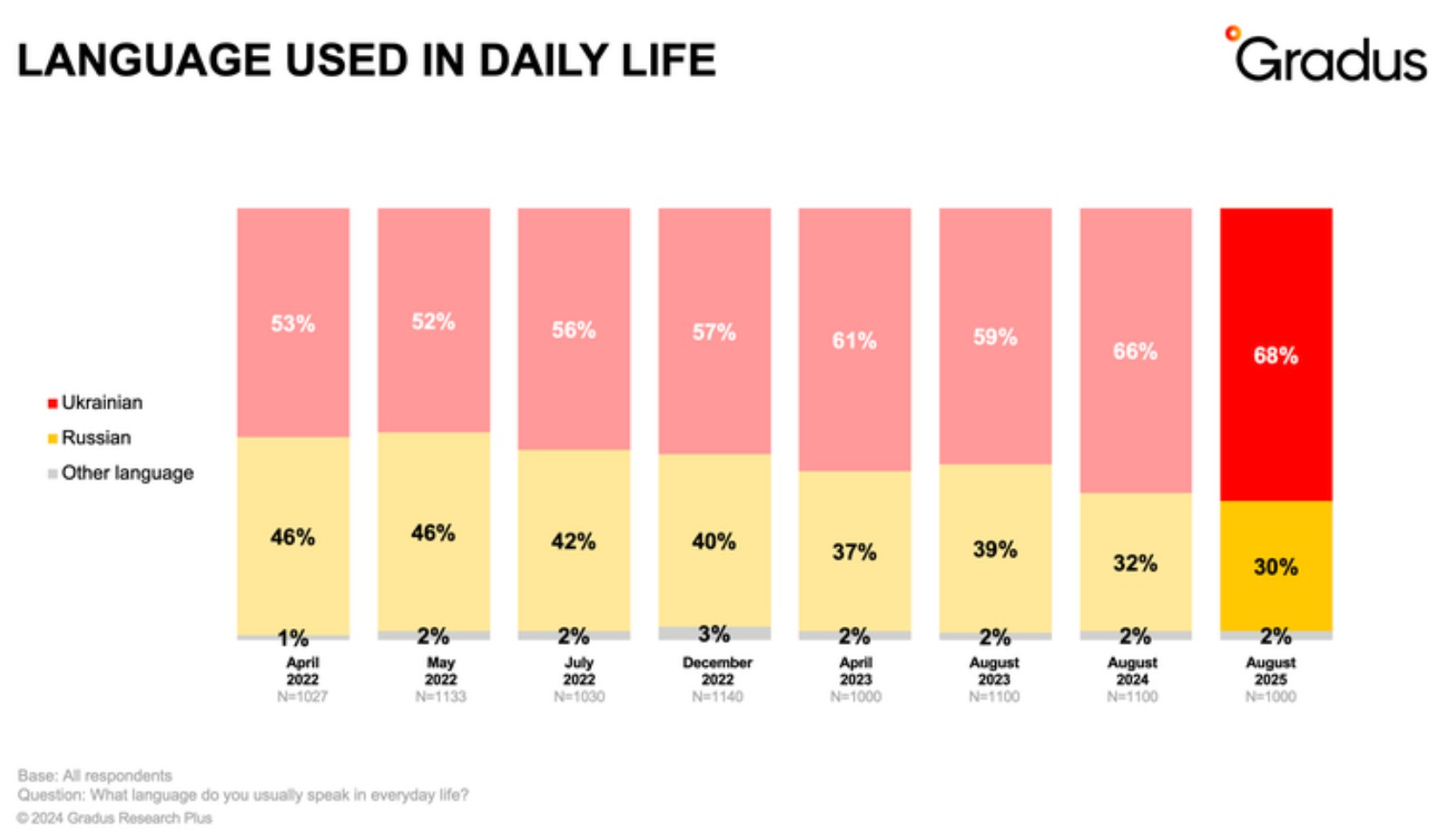When Putin launched his full-scale invasion in February 2022, 46% of Ukrainians spoke Russian at home while 53% used Ukrainian. By August 2025, those numbers had flipped dramatically: 68% now speak Ukrainian daily, compared to just 30% using Russian, according to new survey data from Gradus Research.
The cultural revolution Putin didn’t plan
The speed of this shift, documented in the new Gradus Research survey, reveals how quickly societies can remake themselves under existential pressure. Putin justified his invasion partly as protecting Russian speakers from supposed persecution. Instead, his war has accelerated the voluntary abandonment of the Russian language across Ukraine faster than any government policy ever could.
Three years of bombardment have accomplished what decades of independence couldn’t: the near-elimination of Russian as Ukraine’s second major language. Every missile strike, every destroyed home or hospital, and every forced evacuation has severed another cultural thread linking Ukrainian families to Moscow.
The war intended to keep Ukraine in Russia’s orbit has instead pushed it linguistically toward Europe at unprecedented speed.
What optimism looks like under fire
Despite constant military pressure, Ukrainian confidence in their personal future has slightly increased, rising from 61% last year to 64% this year. The change is modest, but its meaning is significant—it suggests a society that hasn’t broken under the weight of prolonged conflict.
23% say they don’t believe in a better future, while 12% remain uncertain. But the trend points away from despair, even as the war grinds through its fourth year.
Unity forged by a common enemy
The survey also reveals how external threats reshape internal bonds. When asked what unites them most, 67% of Ukrainians point to their “common enemy”—a stark reminder that national solidarity now depends heavily on opposition to Russian aggression.
Only 38% cite national identity as the strongest unifying factor, down from 42% in 2023.
This suggests Ukrainian unity is more situational than organic, held together primarily by the external threat rather than shared cultural foundations.
Yet this wartime solidarity has proven durable. Three years of conflict have tested Ukrainian society’s cohesion without breaking it, even as internal divisions over leadership decisions (50%), political views (47%), and social inequality (47%) persist beneath the surface.
Preparing for the peace to come
Ukrainian expectations for post-war reconstruction reveal a society already thinking beyond survival mode. When asked about opportunities after victory, 45% prioritize continued defense strengthening—though this represents a decline from 52% in previous years, suggesting growing confidence in Ukraine’s military capabilities.
Other leading hopes include:
- Modernizing infrastructure (40%)
- Gaining global economic support (39%)
- Fostering business and entrepreneurship (36%)
But the list of challenges tells a more complex story, as people prioritize the following:
- Economic recovery (57%)
- Rebuilding cities and infrastructure (54%)
- Veteran reintegration (51%)
- Security in occupied territories (51%)
- Healthcare system reconstruction (42%)
The society Putin is actually facing
The Gradus survey, conducted among 1,000 Ukrainians aged 18-60 in cities with over 50,000 residents, captures a nation in the middle of profound transformation.
The Russia that launched this war to bring Ukraine back into its sphere of influence faces a country that has moved further away culturally and emotionally than before the invasion began.
The 2025 Independence Day survey documents how Ukraine has used wartime pressures to accelerate the national consolidation Moscow sought to prevent. The dramatic shift in daily language use represents one of modern European history’s most rapid cultural transformations.
Moscow’s stated goal of protecting Russian speakers has instead coincided with the steepest decline in Russian language use since Ukraine’s independence.




